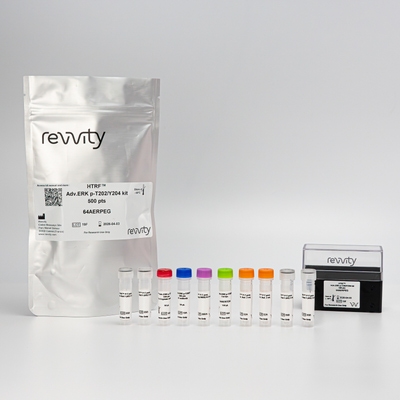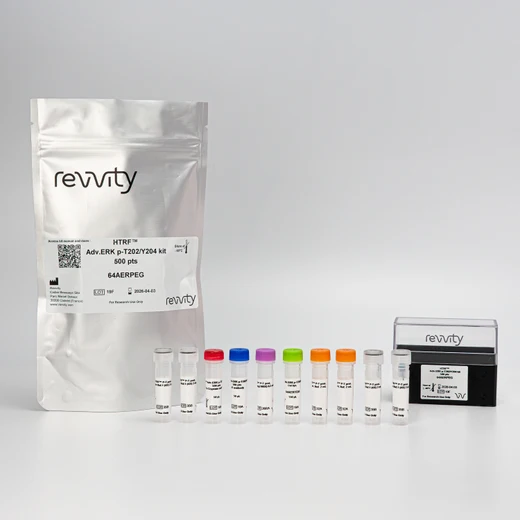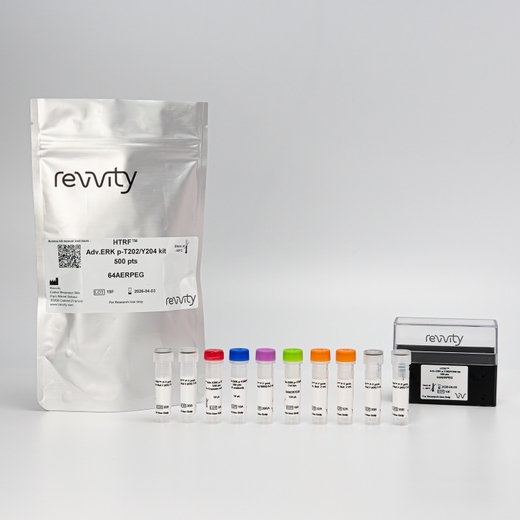

HTRF Human & Mouse Phospho-ERK (Thr202/Tyr204) Detection Kit, 500 Assay Points


 View All
View All
HTRF Human & Mouse Phospho-ERK (Thr202/Tyr204) Detection Kit, 500 Assay Points








The phospho-ERK (Thr202/Tyr204) kit measures ERK protein phophorylated at Thr202/Tyr204 as a readout of MAPK pathway activation.
For research use only. Not for use in diagnostic procedures. All products to be used in accordance with applicable laws and regulations including without limitation, consumption and disposal requirements under European REACH regulations (EC 1907/2006).
| Feature | Specification |
|---|---|
| Application | Cell Signaling |
| Sample Volume | 16 µL |
The phospho-ERK (Thr202/Tyr204) kit measures ERK protein phophorylated at Thr202/Tyr204 as a readout of MAPK pathway activation.
For research use only. Not for use in diagnostic procedures. All products to be used in accordance with applicable laws and regulations including without limitation, consumption and disposal requirements under European REACH regulations (EC 1907/2006).




HTRF Human & Mouse Phospho-ERK (Thr202/Tyr204) Detection Kit, 500 Assay Points




HTRF Human & Mouse Phospho-ERK (Thr202/Tyr204) Detection Kit, 500 Assay Points




Product information
Overview
Phospho-ERK assay kits are designed for the robust quantification of ERK modulation, phosphorylated on Thr202/Tyr204, for GPCR and RTK targeted screening as a MAPK Pathway readout. The simple mix-and-read protocol eliminates all wash steps for faster analysis and high quality output.
Specifications
| Application |
Cell Signaling
|
|---|---|
| Brand |
HTRF
|
| Detection Modality |
HTRF
|
| Molecular Modification |
Phosphorylation
|
| Product Group |
Kit
|
| Sample Volume |
16 µL
|
| Shipping Conditions |
Shipped Ambient
|
| Target Class |
Phosphoproteins
|
| Target Species |
Human
Mouse
|
| Technology |
TR-FRET
|
| Therapeutic Area |
Metabolism/Diabetes
NASH/Fibrosis
Neuroscience
Oncology & Inflammation
Rare Diseases
|
| Unit Size |
500 Assay Points
|
Video gallery


HTRF Human & Mouse Phospho-ERK (Thr202/Tyr204) Detection Kit, 500 Assay Points


HTRF Human & Mouse Phospho-ERK (Thr202/Tyr204) Detection Kit, 500 Assay Points


Citations
How it works
Phospho-ERK (Thr202/Tyr204) assay principle
The Phospho-ERK (Thr202/Tyr204) assay measures ERK when phosphorylated at Thr202/Tyr204. Contrary to Western Blot, the assay is entirely plate-based and does not require gels, electrophoresis or transfer. The Phospho-ERK (Thr202/Tyr204) assay uses 2 labeled antibodies: one with a donor fluorophore, the other one with an acceptor. The first antibody is selected for its specific binding to the phosphorylated motif on the protein, the second for its ability to recognize the protein independent of its phosphorylation state. Protein phosphorylation enables an immune-complex formation involving both labeled antibodies and which brings the donor fluorophore into close proximity to the acceptor, thereby generating a FRET signal. Its intensity is directly proportional to the concentration of phosphorylated protein present in the sample, and provides a means of assessing the proteins phosphorylation state under a no-wash assay format.

Phospho-ERK 2-plate assay protocol
The 2 plate protocol involves culturing cells in a 96-well plate before lysis then transferring lysates to a 384-well low volume detection plate before adding Phospho-ERK HTRF detection reagents. This protocol enables the cells' viability and confluence to be monitored.

Phospho-ERK 1-plate assay protocol
Detection of Phosphorylated ERK with HTRF reagents can be performed in a single plate used for culturing, stimulation and lysis. No washing steps are required. This HTS designed protocol enables miniaturization while maintaining robust HTRF quality.

Simplified pathway
MAPK/ERK cell signaling
The MAPK/ERK signaling cascade is activated by a wide variety of receptors involved in growth and differentiation. The core signal transduction cascade elicits regulation of numerous cellular processes including adhesion, migration, apoptosis, differentiation and metabolism. MEK1/2 catalyze the phosphorylation of ERK1/2 at Tyr204 and Thr202. In response, ERK phosphorylates hundreds of cytoplasmic and nuclear substrates. The wide complexity and diversity of MAPK signaling makes ERK a key regulator and major signaling node in biology.

Resources
Are you looking for resources, click on the resource type to explore further.
4 cellular models: a single GPCR monitoring approach
ERK1/2 phosphorylation is part of a larger GPCR mediated pathway. This...


How can we help you?
We are here to answer your questions.






























